https://www.youtube.com/watch?v=3kS_MsHwm8M&feature=youtu.be
See Praying with Celtic Holy Women for stories of women by Bridget Mary Meehan and Regina Madonna Oliver
Feb 1 – St Brigid: 452-524 AD – miracle worker
"From the time I first directed my mind on God," said Brigid (Mary of the Gael',"I have never taken it away from him."
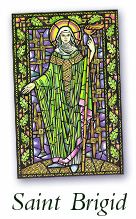 According to the Leabhar Breac, Brigid was such a wonder-worker that her soul must be a blazing sun lighting up the heavenly city. Here we present an edited version of the Life of Brigid as told in the Leabhar Breac: it portrays Brigid as continually subverting normal order with extraordinary miracles.
According to the Leabhar Breac, Brigid was such a wonder-worker that her soul must be a blazing sun lighting up the heavenly city. Here we present an edited version of the Life of Brigid as told in the Leabhar Breac: it portrays Brigid as continually subverting normal order with extraordinary miracles.
Daughter of Dubhthach and a slave-girl named BroicseachBrigid was the daughter of Dubhthach MacDreimhne. Dubhthach had bought a slave-girl named Broicseach and soon she became pregnant by him. Dubhthach’s wife, Breachnat, was furious and threatened to leave him if he did not sell Broicseach to somebody living far away. But Dubhthach didn’t want to sell her.
One day, while Dubhthach and the slave-girl were going past the house of a certain druid, the druid hearing the noise of the chariot, came out to greet them. The druid foretold that they would have a wonderful daughter whose fame would spread far and wide because of her power and virtue.
After this, God sent two bishops – Mel and Melchu – to Dubhthach and when Mel learned of Breachnat’s anger he told her that her own descendants would serve the descendants of the slave-girl. The bishops advised Dubhthach to sell the slave-girl to another druid who came that way, but not to hand over the infant in her womb. Dubhthach agreed to this and the druid took Broicseach to his home.
Miracles surrounding Brigid’s birth
Soon after, another druid from the territory of Conaill purchased the slave-girl. This man prepared a great banquet for the king of Conaill and it so happened that the queen at that moment was on the point of giving birth. A prophet of the learned class who happened to be present was asked if this were a lucky time for a royal birth. He replied that the child born next morning with the rising of the sun would have an outstanding destiny.
Soon after, another druid from the territory of Conaill purchased the slave-girl. This man prepared a great banquet for the king of Conaill and it so happened that the queen at that moment was on the point of giving birth. A prophet of the learned class who happened to be present was asked if this were a lucky time for a royal birth. He replied that the child born next morning with the rising of the sun would have an outstanding destiny.
However, the queen’s child was born before the morning and he was born dead. The druid then asked the prophet about the slave-girl’s child. The prophet answered: “The child born tomorrow at the rising of the sun, and who is born without being inside or outside a house, that child will surpass every other child in Ireland.”
At day-break the slave-girl, Broicseach, was going into a house, holding a bucket of buttermilk in her hand. She had one foot inside the threshold and the other outside the threshold when Brigid was born. The servant-girls washed the baby and the mother with the buttermilk which was in the vessel. Brigid was born on a Wednesday, on the eighth day of the moon, at Fochairt Mhuirthemhne.
Raising up the queen’s babyBrigid was then taken to the place where the queen’s baby lay dead. When Brigid’s breath reached him he became alive and well. The druid and Broicseach and Brigid then went off to Connacht where they settled down.
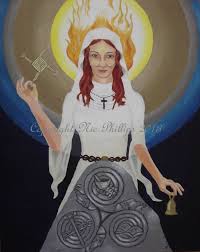 Brigid in ConnachtOne day, the people of the area saw that the house in which the child Brigid was living was on fire. They rushed to the house to put out the flames but found on arrival that there was no fire at all. They concluded that the child was filled with the Holy Spirit.
Brigid in ConnachtOne day, the people of the area saw that the house in which the child Brigid was living was on fire. They rushed to the house to put out the flames but found on arrival that there was no fire at all. They concluded that the child was filled with the Holy Spirit.
Once, while asleep, the druid saw three clerics, or three angels, coming and pouring oil on Brigid’s head to complete the rite of baptism. The three clerics instructed the druid to give the name Brigid to the child.
Brigid was not accustomed to take the ordinary food available to her. For this reason the druid obtained a white cow with red ears and she used to drink the milk of this cow.
As Brigid grew up everything under her care increased and flourished. She took care of the sheep, of blind people and of the poor.
Brigid back with her father DubhthachWhen Brigid grew up into a young girl, the druid gave her back to her father Dubhthach, in the area of Uíbh Fhailí.
Some time later, guests came to Dubhthach’s house and Brigid was preparing five portions of meat for them. It happened that a hungry dog was passing by and Brigid gave him one of the portions of meat. When he had eaten that, she gave him another. Dubhthach, when he saw this, asked, “Have you all the portions?” “Count them,” Brigid replied. He did so and all five portions were there. “That girl works many wonders,” said her father.
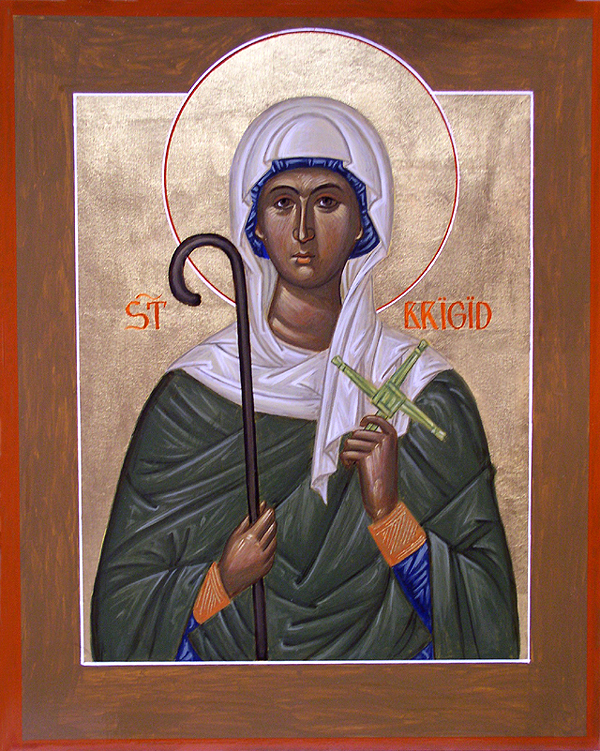 Mary of the Gael
Mary of the GaelOn one occasion, Brigid attended a Synod of Leinster. It happened that a holy man who was present had had a vision in which he saw Mary coming to the meeting. When Brigid entered, this man said: “This is the Mary I saw in a vision,” and from then on, she was called Muire na nGael – Mary of the Irish.
Brigid visits her mother and helps the poor
Without her father’s permission, Brigid went back to her mother, who was poor and ill and still a slave-girl in Connacht. She took over her mother’s duties. At the time of butter-making, she was dividing the butter into twelve divisions in honour of the twelve apostles and a large lump in honour of Jesus, the Son of God. Although she used to give away butter to the poor, the amount manufactured never seemed to be reduced. “It was Christ and his twelve apostles who proclaimed the gospel to the peoples of the world,” said Brigid, “It is in their name that I look after the poor, for Christ is to be found in the person of every faithful poor person.”
Without her father’s permission, Brigid went back to her mother, who was poor and ill and still a slave-girl in Connacht. She took over her mother’s duties. At the time of butter-making, she was dividing the butter into twelve divisions in honour of the twelve apostles and a large lump in honour of Jesus, the Son of God. Although she used to give away butter to the poor, the amount manufactured never seemed to be reduced. “It was Christ and his twelve apostles who proclaimed the gospel to the peoples of the world,” said Brigid, “It is in their name that I look after the poor, for Christ is to be found in the person of every faithful poor person.”
Brigid’s miracles so impressed the druid and his wife that they became Christians. The druid gave Brigid a herd of cows and made her mother a free-woman. Brigid and her mother Broicseach returned to Dubhthach.
Brigid gives her father’s sword to a leperDubhthach, however, was not over-pleased to have his daughter back as he feared his wealth would diminish if Brigid handed over his goods to the poor. He decided to sell Brigid to Dunlaing MacEnda, king of Leinster, as a servant, to grind corn.
Brigid and her father went to the king’s fort by chariot. When they arrived, Dubhthach went inside to meet the king, leaving Brigid and his sword in the chariot. While Dubhthach was inside, a leper happened to pass by and Brigid gave him her father’s sword.
Dubhthach was furious at the loss of his sword and he took Brigid into the fort to meet the king. The king asked her if she intended to give his property away to the poor also. Brigid answered that if all the wealth of Leinster were at her disposal, she would give it away to the King of the Elements. The king said that Brigid’s status was higher in the eyes of God than among men. He gave a sword with an ivory hilt to Dubhthach on Brigid’s behalf and he made her a free-woman.
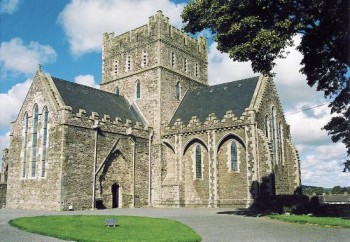
Cathedral of St Brigid, Kildare
Brigid receives ordination as a bishop
Brigid went, along with other virgins, to Telcha Midhe, to receive a nun’s veil from Bishop Mel. It happened that through the bounty of the Holy Spirit, the rite of ordination of a bishop was read over Brigid. MacCaille, another bishop, said that it was not right to confer the status of a bishop on a woman. Bishop Mel replied: “We have no power over it, because it is from God himself that this honour came to her – an honour beyond that of any other woman.” For this reason, Brigid and her successors (coarba) were always regarded as having the honour due to a bishop.
Brigid went, along with other virgins, to Telcha Midhe, to receive a nun’s veil from Bishop Mel. It happened that through the bounty of the Holy Spirit, the rite of ordination of a bishop was read over Brigid. MacCaille, another bishop, said that it was not right to confer the status of a bishop on a woman. Bishop Mel replied: “We have no power over it, because it is from God himself that this honour came to her – an honour beyond that of any other woman.” For this reason, Brigid and her successors (coarba) were always regarded as having the honour due to a bishop.
Eights in Brigid’s lifeIt was on the eighth day of the moon that Brigid was born; she took the veil on the eighteenth day; she went to heaven on the twenty-eighth day; she was consecrated along with eight virgins and she lived her life in accordance with the eight Beatitudes.
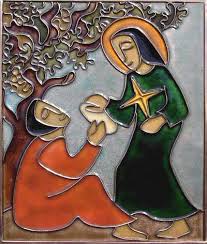 Abundance and healing at EasterWith one sack of malt, Brigid succeeded in providing beer for the seven churches of Tulach for Holy Thursday and the eight days of Easter. On one occasion, Brigid went to a church in Teathbha for the celebration of Easter. On Holy Thursday she washed the feet of the people in the church. Among them were four who were very ill. Brigid cured all four of them.
Abundance and healing at EasterWith one sack of malt, Brigid succeeded in providing beer for the seven churches of Tulach for Holy Thursday and the eight days of Easter. On one occasion, Brigid went to a church in Teathbha for the celebration of Easter. On Holy Thursday she washed the feet of the people in the church. Among them were four who were very ill. Brigid cured all four of them.
Victory over the Uí Néill for the king of LeinsterBrigid made two requests of Dunlaing, king of Leinster, and promised him the kingdom of heaven for himself and his son as a reward. The king, however, took little notice of this promise. ‘I can’t see the kingdom of heaven,’ he said, ‘and nobody knows anything about it. For that reason, I don’t bother about it at all. As for granting the kingdom to my son, I don’t bother about that either, for I myself won’t be around. But give me a long life in my kingdom and give me victory over the Uí Néill in battle, and above all make me win the first battle against them to give me courage for those to follow.’ This was granted, and the king won a great victory over the Uí Néill in the battle of Lochar.
Curing the sick and setting the prisoners free
Once Brigid asked a king to set a certain prisoner free. The king refused her request but he handed over the custody of the prisoner to her for one night. Brigid appeared to him and she instructed him to recite the hymn Nunc populus when the chain which bound him was loosed. He was then to turn to his right-hand and run as fast as he could. He did this and escaped from prison.
Once Brigid asked a king to set a certain prisoner free. The king refused her request but he handed over the custody of the prisoner to her for one night. Brigid appeared to him and she instructed him to recite the hymn Nunc populus when the chain which bound him was loosed. He was then to turn to his right-hand and run as fast as he could. He did this and escaped from prison.
One day when Brigid was travelling in Maigh Laighean (the Plain of Leinster) she met a student and he was running. ‘Where are you rushing to?’ Brigid asked him. ‘I’m going to heaven,’ he answered. Brigid recited the Our Father with him. He was Ninnid Lamh-Idan who when Brigid was about to die came to her to give her Holy Communion.
Bishop Ibar helps Brigid mark out Cill DaraBrigid asked to Bishop Ibar to mark out her city for her. They arrived at the place where Cill Dara now stands. It happened, just then, that Ailill MacDunlainge was going through Cill Dara with a hundred horse-loads of wooden posts. Two of Brigid’s women came and asked Ailill to give them some of the posts. Ailill refused. With that, the horses were glued to the ground and were unable to move. Ailill was forced to give Brigid all the posts and it was with these that she marked the boundary of her monastery in Cill Dara. As a reward, she said that Ailill’s heirs would have the sovereignty of Leinster for ever.
Brigid and the lepersOn one occasion, Brigid gave a cow to each of two lepers. One of them was a proud man and began to insult her. As they were crossing the Barrow, the river rose up against him and he drowned. The humble leper and his cow managed to cross in safety.
Generosity
The Queen of Leinster came to Brigid and gave her a silver chain as an offering. Brigid gave the chain to her nuns and they hid it away without telling her, as she was always giving away things to the poor. A leper came along and Brigid gave him the silver chain. The nuns were furious when they heard that the chain was gone. “Your mercy to everybody is of little use to us,” they complained, “while we ourselves are in need of food and clothes.” “You are a bad lot,” said Brigid., “Go to the church, to the place where I pray, and you will find your chain.” They did so and there was the chain even though she had given it to the leper.
The Queen of Leinster came to Brigid and gave her a silver chain as an offering. Brigid gave the chain to her nuns and they hid it away without telling her, as she was always giving away things to the poor. A leper came along and Brigid gave him the silver chain. The nuns were furious when they heard that the chain was gone. “Your mercy to everybody is of little use to us,” they complained, “while we ourselves are in need of food and clothes.” “You are a bad lot,” said Brigid., “Go to the church, to the place where I pray, and you will find your chain.” They did so and there was the chain even though she had given it to the leper.
Brigid and St Brendan
Brendan heard of Brigid’s miracles and he came to talk to her. Brigid came in from herding her sheep to welcome him. She took off her cloak and hung it on a sunbeam coming in the window. It hung there as if suspended from a crook. Brendan told his servant to hang up his own cloak in the same way but it fell down twice. Brendan’s anger rose and he hung up the cloak on the sunbeam for the third time and this time he was successful. After this, each of them confessed the state of their souls to each other. “It is not usual for me,” said Brendan, “to travel over seven ridges without my mind being directed to God.” “From the time I first directed my mind on God,” said Brigid, “I have never taken it away from him.”
Brendan heard of Brigid’s miracles and he came to talk to her. Brigid came in from herding her sheep to welcome him. She took off her cloak and hung it on a sunbeam coming in the window. It hung there as if suspended from a crook. Brendan told his servant to hang up his own cloak in the same way but it fell down twice. Brendan’s anger rose and he hung up the cloak on the sunbeam for the third time and this time he was successful. After this, each of them confessed the state of their souls to each other. “It is not usual for me,” said Brendan, “to travel over seven ridges without my mind being directed to God.” “From the time I first directed my mind on God,” said Brigid, “I have never taken it away from him.”
Her deathAfter Brigid had founded many monasteries and performed many miracles, she came to the end of her holy life. Generous, patient, humble and forgiving, she was always joyful and steadfast in the service of God.
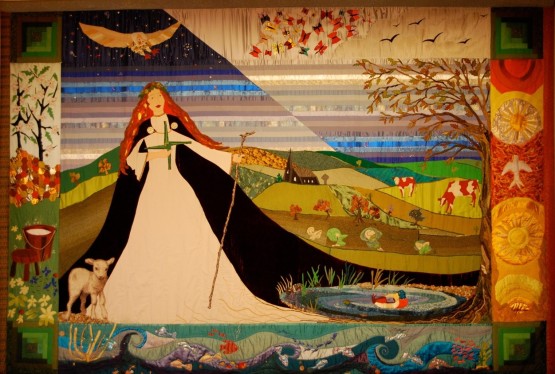
The source for this adaptation of the Life of Brigid from the Leabhar Breac is Seán Ó Duinn OSB’s Foreward to his book The Rites of Brigid: Goddess and Saintpublished in 2005 by The Columba Press. To purchase that book online go to www.columba.ie
Mary of the Gael Sung by Carmel Boyle
https://www.youtube.com/watch?v=jNCWQnssi7w


No comments:
Post a Comment
Note: Only a member of this blog may post a comment.